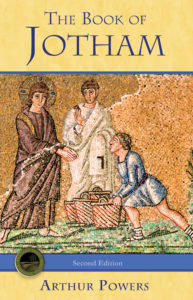 Award-winning Catholic Fiction
Award-winning Catholic Fiction
THE BOOK OF JOTHAM by Arthur Powers
For 23 years, the completed manuscript of The Book of Jotham sat in the author’s desk drawer – typewritten – collecting dust and time. On an early autumn day in 2012, the manuscript arrived at Tuscany Press, which awarded it the 2012 Prize for Catholic Fiction – Novella winner. They published it shortly thereafter. When Tuscany Press closed its doors, Full Quiver Publishing took on the task of publishing the second edition of this remarkable novella.
Jotham’s a mentally challenged man-child who, with the other apostles, follows Jesus as Christ carries out his ministry and experiences death by crucifixion, resurrection, and ascension. Yet the other apostles – the dedicated Mary, Peter, Thomas, and the rest – while they care for Jotham and look out for him, don’t understand why Jesus loves him so. Thomas even says, after Jesus offers a parable, “I don’t see why all the pots can’t be strong and beautiful.”
Jotham may be different, but through him, we come to see Jesus and Jotham, not just with our eyes but also with our hearts.
Reviews:
“The Book of Jotham chronicles the spiritual journey of the fictional protagonist, from his initial fears due to his personal limitations to his discovery of his self worth in Christ. Written from the perspective of the title character, the author gives the reader a unique insight into the mind and the heart of one who is mentally challenged. And by placing the narrative in the familiar setting of Jesus’ public ministry and using Biblical characters like Mary, Peter and the Apostles, the reader is able to experience the Gospel story anew, through the eyes and gradual progression of faith of Jotham. The universal theme of the grace of adoption helps us to discover that, as children of Light, our conversion and progression of faith may not be so different from those who experience life like Jotham.” + Daniel Cardinal DiNardo, Archbishop of Galveston-Houston
“This… is called “The Book of Jotham” because it’s a sort of Gospel according to the eponymous character. The ways in which St. Mary Magdalene and Judas Iscariot relate with their disabled brother are particularly powerful. The Book of Jotham is a work that never preaches but which will evoke a powerful pro-life response from the reader.” Joseph Pearce, author
“The book is a gem for anyone serious about a genuine, loving relationship with God.” Kaye Park Hinckley, award-winning author
“Reading The Book of Jotham is a powerful and life-changing event. I really felt drawn into the story and actually believed that I could see out of Jotham’s eyes. This is a masterpiece of writing and deserves to become a classic. ” A.K. Frailey, author
“This novella won first place in the Tuscany Press competition for Best Novella for a reason. Try to imagine experiencing discipleship with Christ unencumbered by the burden of rationalism. Powers’ depiction of a mentally challenged young man who follows Christ is more than moving–it’s revealing. Then, because language itself is a product of rationalism, try to imagine how that discipleship might be expressed non-verbally, internally. Powers accomplishes something amazing here.” Dena Hunt, award-winning author
“Wonderful book. It’s hard to write a compelling narrative when the reader knows the historical events, but Powers does a masterful job. He bravely uses a second-person point of view to pull the reader into the story, to become the mentally challenged young protagonist sitting on the side of the road when a charismatic rabbi comes along. You’ll fly through the pages, but then read a second time to enjoy the poetry of the words.” Ronald B. O’Gorman, MD, author
Excerpt from The Book of Jotham
LIGHT OR DARKNESS. Warmth or cold.
You know them. Feel them.
The fire in black night. The afternoon sun in winter. The hoe handle, hard and grained in your large palms, moving up and down in your father’s field. Up and down. Up and down.
“Not just over there, boy. Move along.”
Father’s anger. Not dark or cold, but hurt like a wounded dog, snapping out with sharp teeth. Hurting you inside.
“Lord, how have I sinned to have such a son?”
“Shh, Judah It’s no sin…”
“Silence, Sarah.”
“The boy loves us, Judah. He’s from God…”
Mother. Lightest light. Warmest warmth. When you are near her, you feel inside like the shade of grape leaves on a spring day. Cool water in the well. Small sparrows in the air.
Where she goes, you follow. She bakes bread at the fire and sings. You smile. She turns and smiles up at you, her brown eyes warm and soft.
Until one day she’s gone.
“She’s dead,” your sister says. “She won’t come back.”
Adina’s eyes glisten wet. You are sitting on a mat and she is leaning over, in front of you, her face looking into yours. Her thin hands tighten hard on your shoulders. She shakes you.
“Do you understand?”
You move your head up and down, and she goes away. Up and down goes your head, up and down. You feel dark and cold, so dark and cold, there will never be anything else. You stand up and look for your mother. She is not by the fire. You go outside. The fence, the field. “Ma…Mama!” you call. “Ma…Mama!”
She isn’t there. The sun is empty and cold. The wind is dark, so dark.
“Mama!”
“Stop it! Stop it!”
Adina screams in front of you. She looks up at you, angry like the hurt dog. Her thin hands stretch out. Her screams hurt you inside. Drops of water run down her cheeks from her hurting eyes.

